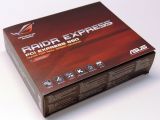ASUS may not be the kind of company anyone would expect to launch a PCI Express solid-state drive, but nevertheless here we are, waiting on the RAIDR compound storage card.
Previously, the Republic of Gamers brand was one that ASUS strapped onto its very best motherboards, graphics cards, notebooks, audio devices and peripherals.
Storage units are a new addition, making it doubly strange that a PCI Epxress SSD, of all things, is the first of them.
Called RAIDR, the PCI Express card comes in 120 GB and 240 GB, or will come in those capacities when it finally becomes available.
Speaking of which, shipments will supposedly start at some point around the middle of May 2013 (next month).
The maximum read speed, according to SweClockers, is supposed to be of 765 MB/s when reading and, bizarrely enough, 775 MB/s when writing, for the 120 GB model. Maybe it was just a mix-up and the speeds are the other way around.
The 240 GB drive will, predictably enough, be even faster, with transfer speeds of 830 MB/s read and 910 MB/s write.
RAIDR communicates with the rest of the system over the PCI Express 2.0 x16 interface, though x4, x8 and x16 slots work fine too, assuming people have nothing better to use them for like, say, graphics cards.
The NAND Flash chips are designed on the 19nm manufacturing process from Toshiba, and use 16 KB page size.
As for the controller responsible for the aforementioned performance, it is the SandForce SF2281. There are actually two of them, each handling a different SSD subunit. A hardware-abstract RAID 0 configuration makes them appear as a single entity in Windows.
Needless to say, TRIM, NCQ and SMAET are fully supported, in spite of the RAID, and so is booting (even Windows 8 Secure Boot).

 14 DAY TRIAL //
14 DAY TRIAL // 


